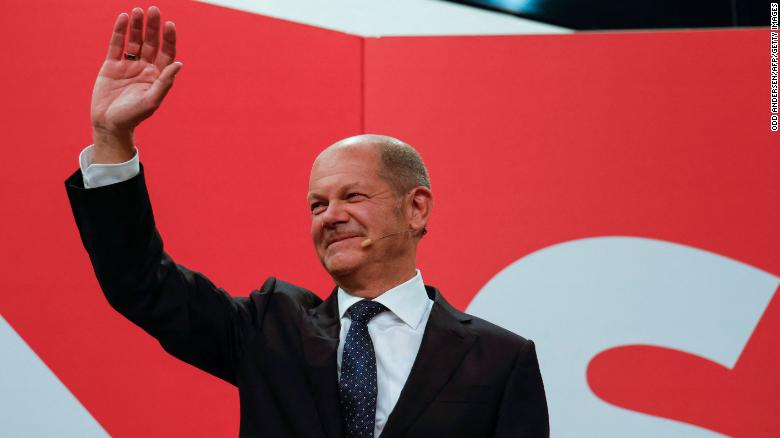Who is Angela Merkel?
3:16
(CNN) -
Angela Merkel is about to step down as Germany's chancellor after 16 years, ushering in a new era for Europe's largest economy.
The results of Sunday's elections are difficult to predict, and the formation of a government could take weeks or months to unfold.
But when the dust settles, polls indicate that the new chancellor could be Olaf Scholz of the left-leaning Social Democratic Party (SPD), who led the German economy during the pandemic as finance minister in a coalition with Merkel.
Meanwhile, the Greens could double their number of seats in Parliament.
Who will be Angela Merkel's successor?
Scholz's SPD and the Greens could team up with the pro-business Free Democratic Party (FDP), gaining enough power to shift the country's economic agenda to the left.
Taxes and spending could rise as political leaders double down on digitization and climate policy, while concerns about rising public debt could take a backseat.
"Greens and Liberals in a coalition would bring the freshest innovative forces we've had in a long time in a German government," said Carsten Brzeski, ING's Global Head of Macro Research.
Olaf Scholz, from the Social Democratic Party (SPD).
Spend more, worry later?
World banks say the end result of the post-election contest between parties is far from certain, while advising investors to prepare for two possible outcomes: a coalition of the SPD, the Green Party and the FDP, or a narrow victory for the center-right Merkel's Christian Democratic Union (CDU), led by Armin Laschet, who would probably also have to team up with the Greens and the FDP.
advertising
The first option would mark a move to the left, but it would be less dramatic than an alliance between the SPD, the Greens and the hard-left Die Linke party.
This result, which could lead to much more ambitious efforts to redistribute wealth and collect taxes, has been downplayed by analysts, and would likely take investors by surprise.
Whichever combination takes command will have to manage the ongoing recovery from the coronavirus pandemic.
The German economy is on track to grow 2.9% this year and 4.6% next, after contracting 4.9% in 2020, according to the latest projections from the Organization for Economic Cooperation and Development.
However, recent data indicates that momentum may be losing steam.
The Ifo index, which tracks the country's business climate, fell for the third consecutive month in September, according to data released on Friday.
Slower growth in China, blocked supply chains and rising gas prices may be taking their toll.
This setback could increase pressure on the country's new leaders to remove notoriously strict German fiscal rules and to continue spending on the national economy.
The country enshrined the so-called "debt brake" in the Constitution in 2009, severely limiting public indebtedness after the financial crisis, with few exceptions.
Due to the pandemic, borrowing rules were suspended until 2023. This allowed German borrowing to skyrocket, and the country's debt-to-GDP ratio to rise sharply to 70% in 2020.
Although that ratio pales in comparison to that of the United States, where debt is projected to exceed annual GDP, German centrist parties have been eager to get back in control of the country's public finances.
The Greens, for their part, want a more permanent relaxation of borrowing rules.
UBS strategists Dean Turner and Maximilian Kunkel believe that the debt brake - which has become a key tenet of German fiscal conservatism - is likely to be maintained, as reversing it would require a two-thirds majority in Parliament. .
More than 10,000 Afghan refugees seek to leave Germany 0:50
However, they hope that the new German leaders will find other ways to increase spending to deal with the climate crisis, an issue that became even more important after the devastating floods that hit the country in July.
"The only area of common agreement for all parties is the need to address climate change," wrote Turner and Kunkel in a recent research note.
Whichever coalition emerges, they continued, investment in climate policy "will increase."
Addressing the climate crisis
Brzeski hopes that the incoming government coalition, whatever its composition, will create a special investment mechanism to bypass the debt brake, allowing money to flow towards green initiatives.
However, with a more liberal coalition government, some deadlines could be advanced.
"[The Greens] are likely to push for acceleration of the ecological transition of the German economy as a precondition for entering government," Goldman Sachs said in a recent note to clients.
The Green Party has called for a 70% reduction in greenhouse gas emissions from 1990 levels by 2030, compared to the current government target of 65%.
He also wants coal plants to be shut down by the end of this decade, rather than in 2038, and for new cars to be emission-free then as well.
They denounce Russia for attacks before German election 0:58
This could provoke a confrontation with the most powerful companies in Germany.
In its latest strategy update, Volkswagen said it wanted 50% of sales to come from electric cars by 2030, and to increase to almost 100%, by 2040.
The degree of state intervention could generate friction between the members of the coalition.
"The biggest controversy will be how to change people's behavior," Brzeski said.
"Do you do it through incentives and educating people, or do you do it [by increasing] prices and costs?"
A left-wing government in Germany could also mean higher taxes for the richest Germans, as the SPD proposes a new wealth tax for the super-rich.
But the banks stress that it remains very unclear how the elections will unfold, and that the more conservative CDU could prevail, keeping Germany more firmly on its current fiscal and economic path.
Climate change Elections

